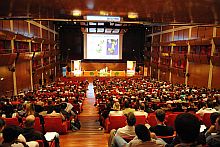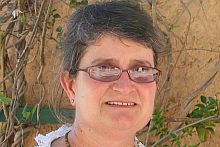Sparking a passion for science: Euroscience Open Forum
|
In July, Dr Nicky Allsopp, SAEON Fynbos Node Manager*, attended the Euroscience Open Forum (ESOF2010) in Torino, Italy. This proved to be an interesting and exciting exploration of the world of European and international science in the broader context of human society.
ESOF was established to foster an arena to discuss the role of sciences, including the humanities, in society. It is not an ordinary science conference where the aim is to disseminate the latest findings in one’s discipline to a group of one’s peers. That’s not to say that cutting edge science is not being presented, but that its presentation is aimed at stimulating a broader awareness of that science among scientists and the public, managers, educators, policy makers and business. The forum aims to strengthen the links between science and society, foster innovation from science and strengthen and influence European science and technology policies.
How science may or may not influence policy was a theme in many of the symposia in the scientific programme. Dr Nicky Allsopp presented a case study of how equilibrium theory in ecology has influenced rangeland policy in a symposium dealing with the diversity of theories in each discipline. This diversity may make it difficult for scientists to assess each other’s work in interdisciplinary research and makes it difficult for policy makers to assess the validity of evidence being presented.
The session on “Access to scientific knowledge: sustainable development issues and the need for a new type of metaknowledge” proposes that a toolbox presenting the plurality of theories in each discipline, and their blind spots, be compiled to assist scientists and policy makers in assessing evidence from interdisciplinary research.
The world of science beyond the lab
In addition to the more formal science symposiums, there were plenary lectures on subjects of broad scientific interest from nanotechnology, open access to academic research outputs to aging and the human mind. Symposia with a career focus were aimed at young scientists. Students covered the world of science beyond the lab: jobs, funding, communication, policy, ethics, scientists’ mobility: brain drains and brain gains, management and linking to business, and much more.
A Science to Business section had symposia showcasing specific applied innovations, the role of science in promoting innovation in business, how to cross the divide between the lab and the market, intellectual property and knowledge management, and policy to promote innovation.
Science in the City
Science in the City events and tours provided a boggling array of activities highlighting science and innovation (from gastronomy to astronomy) in and around Torino. ESOF was rounded off with an exhibition hall with stands promoting all aspects of science, scientific institutions and solutions for creating a better environment. An exciting science discovery centre kept kids (and the author) entertained with interesting ways of conveying scientific ideas from generating electricity with a bicycle to the efficiency of photon capture by photovoltaic cells.
LifeWatch
Among the exhibitions was one on “LifeWatch”, an initiative very similar to SAEON’s data portal, aimed at developing the infrastructure and governance structures of a European-wide database for marine and terrestrial research.
The rest of the world was not ignored, and several presentations and exhibitions highlighted research and opportunities for research partnerships in Africa and elsewhere. Dr Nicky Allsopp was invited by the South African Department of Science and Technology’s representative to the EU, Daan du Toit to present on SAEON in a symposium, South Africa, a strategic science and technology partner for Europe. Mmboneni Muofhe of the Department of Science and Technology highlighted a range of successful cooperative science projects in South Africa.
In the words of Helga Nowotowny, Chair of ESOF2010 Programme Committee and President of the European Research Council, “Science is an intrinsically social and cultural activity, the ultimate manifestation of what human creativity can achieve”.
ESOF2010 opened up many ways to bring science closer to society to provide us with innovative approaches to solve our problems creatively.
The next ESOF will be in Dublin in 2012.
* The ANR (French National Research Agency) is thanked for funding Dr Nicky Allsopp’s attendance of ESOF through the EBPBiosoc research programme.





